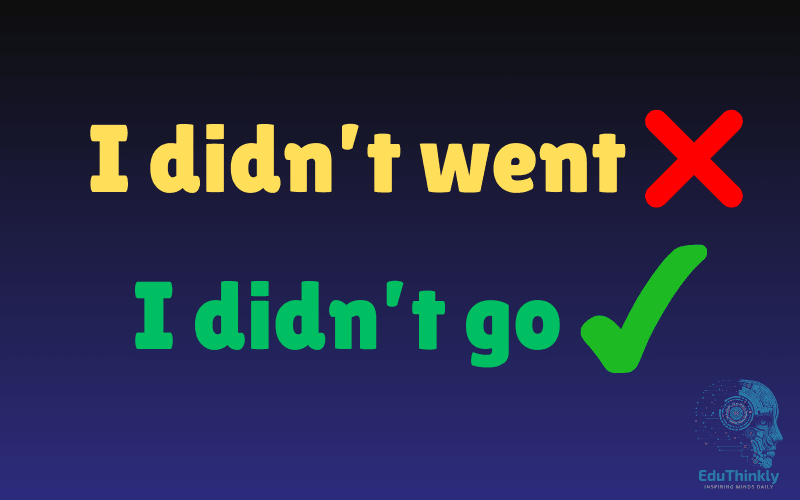30+ Common English Mistakes European Learners Make – And How to Fix Them
english
11 Jul 2025, 02:16

Keep reading below:
Introduction 🧠
Even after years of studying English, many learners across Europe continue to make small but noticeable mistakes. These errors often affect fluency, clarity, and even confidence — especially in professional or academic environments.
In this guide, you'll discover 30+ of the most common English mistakes made by intermediate and advanced learners. Each mistake is presented with a simple correction and a quick explanation to help you improve immediately.
Mistakes 🚫 + Fixes ✅ + Explanations💡
1
I very like it ❌
I really like it ✅
"Very" doesn’t go before verbs. Use "really" instead.💡
2
I didn’t went ❌
I didn’t go ✅
Use the base form of the verb after “didn’t”.💡
3
I’m boring ❌
I’m bored ✅
“Boring” = you cause boredom. “Bored” = you feel it.💡
4
He told me to not go ❌
He told me not to go ✅
The natural word order is “not to go”.💡
5
I have 25 years ❌
I am 25 years old ✅
Age is expressed with “am”, not “have”.💡
6
More better ❌
Better ✅
“Better” already means “more good”.💡
7
I’m agree ❌
I agree ✅
“Agree” is a verb, not an adjective.💡
8
I make a photo ❌
I take a photo ✅
In English, we “take” photos, not “make” them.💡
9
She speaks very well English ❌
She speaks English very well ✅
The adverb should come after the object.💡
10
At Monday ❌
On Monday ✅
We use “on” with days of the week.💡
11
Do you can help me? ❌
Can you help me? ✅
Don’t use “do” with modal verbs like “can”.💡
12
She don’t like coffee ❌
She doesn’t like coffee ✅
Use “doesn’t” with “she/he/it”.💡
13
I have visited Paris last year ❌
I visited Paris last year ✅
Use simple past with specific time references.💡
14
Let’s go to shopping ❌
Let’s go shopping ✅
Don’t use “to” before gerunds (-ing forms).💡
15
Thanks God ❌
Thank God ✅
Fixed expression: “Thank God” (no “s”).💡
16
I lost the bus ❌
I missed the bus ✅
We “miss” a bus, not “lose” it.💡
17
I suggest you to go ❌
I suggest you go ✅
“Suggest” is not followed by “to”.💡
18
It depends of the situation ❌
It depends on the situation ✅
Use “on” after “depends”.💡
19
I am playing since 2 hours ❌
I have been playing for 2 hours ✅
Use present perfect continuous with “since” or “for”.💡
20
He is married with a doctor ❌
He is married to a doctor ✅
Use “married to”, not “with”.💡
21
I didn’t knew that ❌
I didn’t know that ✅
“Didn’t” takes the base form: “know”.💡
22
She has a 5 years old son ❌
She has a 5-year-old son ✅
Compound adjectives use singular form.💡
23
He said me the truth ❌
He told me the truth ✅
“Tell” is used with a person; “say” without.💡
24
I am good in tennis ❌
I am good at tennis ✅
Use “good at”, not “good in”.💡
25
I studied during 3 hours ❌
I studied for 3 hours ✅
Use “for” when talking about duration.💡
26
He’s more tall than me ❌
He’s taller than me ✅
Use the correct comparative form: “taller”.💡
27
She didn’t came yesterday ❌
She didn’t come yesterday ✅
“Didn’t” needs the base verb.💡
28
I am here since two hours ❌
I have been here for two hours ✅
Use present perfect with “since” or “for”.💡
29
I didn’t saw it ❌
I didn’t see it ✅
Base verb only after “didn’t”.💡
30
I am interesting in traveling ❌
I am interested in traveling ✅
Use “interested” to describe your feelings.💡
Final Thoughts
Correcting these common mistakes may seem small — but the impact on your fluency, professional image, and confidence is huge. Consistently practicing these fixes will help you speak and write English more naturally, just like a native speaker.
Want more real-world English learning tips?
Follow eduthinkly for future lessons, guides, and free resources.